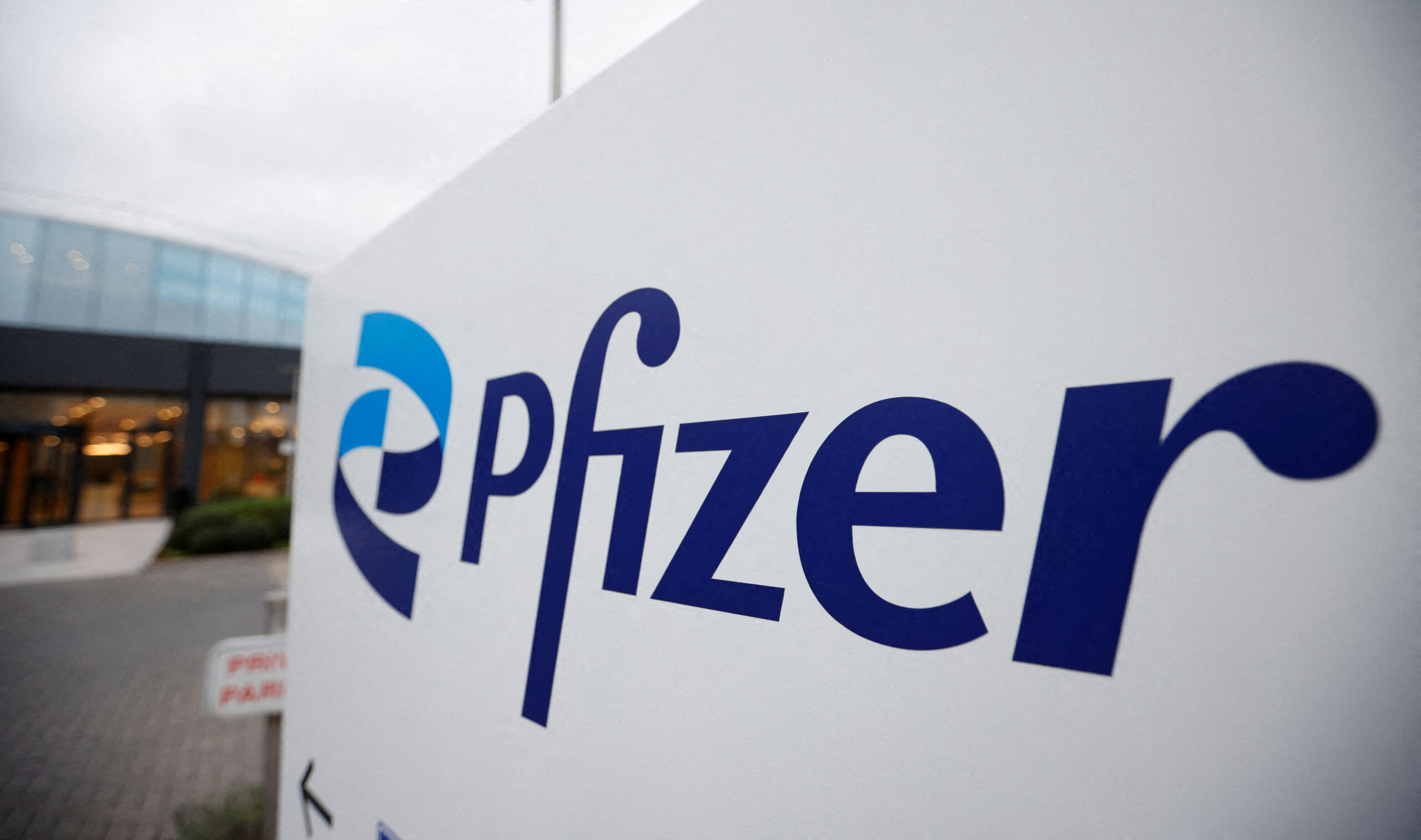Business
Pfizer Advances Once-Daily Weight Loss Pill After Early Study Success

Pfizer is advancing a once-daily version of its weight loss medication, danuglipron, following encouraging findings from an ongoing early-stage study. The pharmaceutical company announced on Thursday that it has identified a formulation that shows a favorable safety profile and effective bodily response.
The company plans to carry out more early-stage trials in the latter half of this year to determine the optimal dosage, with results expected by the first quarter of next year. These results will be pivotal for the registration enabling studies required for regulatory approval.
Dr. Mikael Dolsten, Pfizer’s outgoing Chief Scientific Officer, expressed optimism about the drug’s potential, stating, “Danuglipron has demonstrated good efficacy in a twice-daily formulation, and we believe a once-daily formulation has the potential to have a competitive profile in the oral GLP-1 space.” Notably, the study found no liver safety issues with the once-daily formulations.
Pfizer is among several pharmaceutical companies racing to capture a share of the market for GLP-1 agonists, a class of drugs highly sought after for weight loss and diabetes management. Analysts predict this market could be worth approximately $100 billion by the end of the decade.
Despite this potential, Pfizer has faced challenges breaking into the GLP-1 space. In December, the company discontinued a twice-daily version of danuglipron due to patient tolerance issues in a mid-stage study. Investor confidence was further dampened when Pfizer scrapped another once-daily pill in June 2023 after patients showed elevated liver enzymes. These setbacks, alongside the decline of its Covid business, have impacted Pfizer’s stock performance.
Nonetheless, Pfizer continues to develop other experimental obesity drugs and maintains a robust pipeline of three clinical and several pre-clinical candidates. “Obesity is a key therapeutic area for Pfizer,” Dolsten emphasized.
Competitors Novo Nordisk and Eli Lilly have seen rising demand for their injectable GLP-1 drugs, despite high costs and limited insurance coverage. These companies, along with Pfizer, are striving to develop oral versions that are more convenient for patients and easier to produce, which could help alleviate supply shortages in the U.S.
Pfizer has also indicated it may pursue acquisitions or partnerships with smaller obesity drugmakers. CEO Albert Bourla mentioned in January that while acquiring a late-stage obesity treatment is unlikely, the company is exploring potential licensing deals or earlier-stage weight loss drugs as part of its strategic focus on cost management.
Business
Gold price rises after US captures Venezuela’s Maduro

Global financial markets reacted swiftly after the United States captured Venezuelan President Nicolás Maduro, with investors moving to position themselves amid heightened geopolitical uncertainty and expectations of shifting economic dynamics.
Prices of precious metals rose sharply as market participants sought the relative safety of so-called safe-haven assets. Gold climbed by about 2.4% to $4,433 (£3,293) an ounce, reflecting increased demand from investors looking to protect portfolios against global risk. Silver also recorded strong gains, rising by 4.9%, underlining a broader move into defensive assets during early trading.
Defence stocks across Europe advanced in response to the weekend’s developments, as investors anticipated the possibility of higher military spending by governments reacting to changing geopolitical realities. Analysts noted that such shifts often benefit defence firms in the short to medium term, contributing to the positive momentum seen in the sector.
Oil markets, by contrast, were more measured. Crude prices fluctuated in early Monday trading as investors assessed whether Washington’s intervention in Venezuela could materially affect global supply. Brent crude edged up just 0.5% to $61.06 a barrel, with analysts pointing out that ample global supplies were likely to cushion any potential disruption from Venezuela.
Despite the relatively stable oil price, energy stocks — particularly in the United States — showed notable strength. Shares in US oil companies rose in premarket trading on expectations that American firms could gain greater access to Venezuela’s vast oil reserves. Chevron, currently the only US company operating in the country, saw its shares jump by more than 7%, signalling investor optimism about future opportunities.
US President Donald Trump has openly stated his intention to tap into Venezuela’s significant oil wealth following the seizure of Maduro. He said the United States would “run the country until such time as we can do a safe, proper and judicious transition”, comments that markets interpreted as a signal of potential policy shifts with long-term economic implications.
Business
US TikTok Users Migrate to RedNote as Ban Deadline Approaches

With a potential TikTok ban looming in the United States, many of the app’s 170 million American users are flocking to the Chinese platform RedNote. Dubbed “TikTok refugees,” these users have propelled RedNote to the top spot on Apple’s US App Store as of Monday.
RedNote, known in China as Xiaohongshu or “Little Red Book,” boasts approximately 300 million monthly users and combines features similar to TikTok and Instagram. It is particularly popular among young urban women in China, Taiwan, and other Mandarin-speaking regions, offering a platform for exchanging lifestyle tips on topics ranging from fashion to relationships.
The app’s growing popularity comes as the U.S. Supreme Court prepares to decide on a law requiring TikTok to sell its U.S. operations by January 19 or face a ban. TikTok has refused to sell, arguing that such a move would violate the free speech rights of its users.
RedNote has embraced its influx of U.S. users, with 63,000 posts tagged “TikTok refugee” providing guidance on navigating the platform and learning basic Chinese phrases. One U.S. user humorously wrote, “To our Chinese hosts, thanks for having us—sorry in advance for the chaos.”
Despite its warm reception, RedNote is not without controversy. Critics point to censorship concerns, particularly regarding criticisms of the Chinese government. Additionally, public officials in Taiwan are restricted from using RedNote due to perceived security risks associated with Chinese software.
As U.S. users join RedNote, some Chinese users have joked about being labeled “Chinese spies,” referencing U.S. officials’ concerns over TikTok’s alleged ties to Chinese government surveillance. However, RedNote has distanced itself from political associations, stating that its name does not reference Mao Zedong’s famous “Little Red Book.”
Business
Bitcoin Hits Historic High of Over $106,000

Bitcoin has soared to a new all-time high, briefly surpassing $106,000 (£83,890) on Monday during Asian trading hours. The cryptocurrency’s unprecedented rally marks a 50% surge since Donald Trump’s victory in the U.S. presidential election on November 5, with market sentiment buoyed by the incoming administration’s pro-cryptocurrency stance.
The Trump administration has signaled a friendlier approach to digital currencies compared to its predecessor. Notably, President-elect Trump recently announced plans to explore creating a national Bitcoin reserve, akin to the U.S. strategic oil reserve, to support the cryptocurrency’s strategic adoption.
Peter McGuire of trading platform XM.com attributed the surge to growing “FOMO” (fear of missing out) among investors. “The Bitcoin rally since the election has been parabolic,” McGuire explained. “Many investors believe $120,000 is achievable by the end of the year, and projections for mid-2025 suggest prices could exceed $150,000.”
Adding to the market optimism, Trump has appointed David Sacks, a Silicon Valley entrepreneur and former PayPal executive, as his AI and cryptocurrency czar. Sacks, known for his close ties to Trump advisor and billionaire Elon Musk, is expected to play a significant role in shaping the administration’s blockchain and cryptocurrency policies.
-

 News4 days ago
News4 days agoTwo people confirmed dead in clashes between protesters and security forces in Iran
-

 News4 days ago
News4 days agoTrump Issues Strong Warning as Global Attention Focuses on Iran’s Unrest
-

 Sports4 days ago
Sports4 days agoVenus Williams Makes Historic Australian Open Return at 45 After Receiving Wildcard
-

 Sports4 days ago
Sports4 days agoJohnson Embraces New Chapter at Crystal Palace After Record £35m Switch
-

 News4 days ago
News4 days agoTeenagers Among the Missing as Swiss Bar Fire Tragedy Unfolds
-

 News3 days ago
News3 days agoSwiss Prosecutors Move to Ensure Accountability After Crans-Montana Fire Tragedy
-

 News4 days ago
News4 days agoAnthony Joshua’s driver charged over a tragic road accident
-

 News3 days ago
News3 days agoTrump Promises Clarity After US Operation in Venezuela










